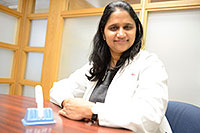Dr. Nitika Pant Pai
Point of Care HIV Testing
McGill University
 “My research mission is to develop rapid screening strategies that directly impact patient care across global settings,” says Dr. Nitika Pant Pai of McGill University. “I feel our role as researchers is to generate the best quality evidence that can be used by decision makers and translated into policy. Unless the policy gets changed, diagnostic tools or products or drugs are never going to reach patients.”
“My research mission is to develop rapid screening strategies that directly impact patient care across global settings,” says Dr. Nitika Pant Pai of McGill University. “I feel our role as researchers is to generate the best quality evidence that can be used by decision makers and translated into policy. Unless the policy gets changed, diagnostic tools or products or drugs are never going to reach patients.”
As a physician in India, life moved in a very different direction when Dr. Pant Pai decided to come to the US to complete a Masters in Public Health and a PhD in epidemiology and biostatistics. “In the US, I really wanted to explore HIV diagnostic and treatment challenges faced by marginalized populations so I began investigating antiretroviral treatment interruptions,” explains Dr. Pant Pai. At the time of her PhD at UC Berkeley, the oral HIV test was catching the attention of the HIV research community. With support from NIH, Dr. Pant Pai conducted research evaluating the diagnostic performance of this new point of care HIV in a rural setting in India where, at that time, options to rapidly screen for HIV were limited. The oral point-of-care tests were found to be 100% accurate and her work garnered international attention. She further investigated them in the labor room as tools to promote timely care to prevent mother to child HIV transmission.
Supported by a CIHR New Investigator Award that helped launch her career at McGill University, the practical application of the oral HIV test has become the focus of Dr. Pant Pai’s research.
With the ease and reliability of HIV testing amongst limited health care support, Dr. Pant Pai wondered whether the oral HIV test could be used to self test. In a group of students at McGill, she evaluated a paper-based strategy for self-testing. “Basically we walked participants through the process of self-testing, pre-test counseling, staging their risk for HIV by themselves, understanding their results, and providing them with a counselor on a telephone hotline.”
With encouraging results from this study, an online version was developed and tested in health care professionals of the University of Cape Town, South Africa.“People don’t want to get tested because of the stigma and discrimination associated with an HIV diagnosis. They do not want to wait in line or be seen in the facility,” explains Dr. Pant Pai. “The self-testing strategy that we offered was loved by patients, so much so that we had planned to conduct the study for six months and we got it done in three because so many people came in to get screened.” Supported by Grand Challenges Canada and an Innovation Award from the World Bank, Dr. Pant Pai is now working on developing an all platform application to support self testing and scaling up for use in many countries including South Africa, India and Canada.
In addition to HIV testing, Dr. Pant Pai is branching into research on multiplex strategies—where one test can detect many HIV co-infections simultaneously (i.e., Hepatitis C and B, syphilis)—with support from CIHR she has completed studies in Montreal and Mumbai. She is developing multiplexed strategies for pregnant women with the support of Grand Challenges Canada.
It’s the reward of seeing her work make a difference that inspires Dr. Pant Pai to follow new avenues. “We know our work has impacted lives beyond our academic community. When I see patients, community based organizations and international health agencies benefit from our findings, it is the most gratifying part of my work.”
The Canadian Association for HIV Research (CAHR), the CIHR HIV/AIDS and STBBI Research Initiative, the Canadian Foundation for AIDS Research (CANFAR), the CIHR Canadian HIV Trials Network (CTN) and the Canadian HIV Vaccine Initiative (CHVI) Research and Development Alliance Coordinating Office (ACO) would like to congratulate Dr. Pai for her significant contributions to our understanding of the HIV epidemic. Her work is part of a larger Canadian research effort that is making a difference in the lives of those affected by HIV in Canada and around the world.
- Date modified: